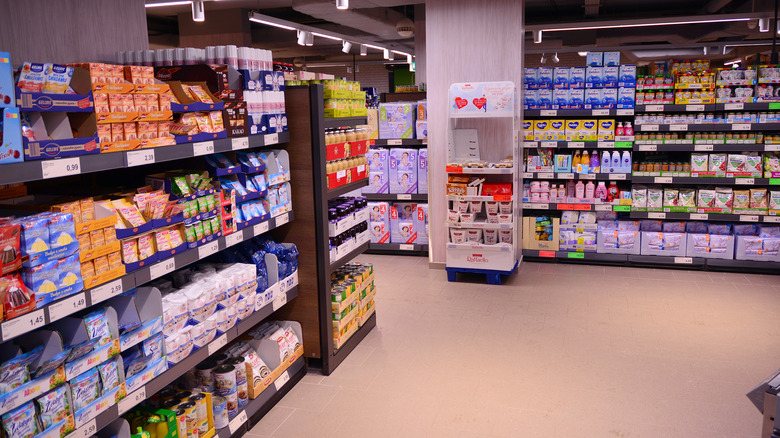The Reason Why Aldi Scrapes By With Its Blatant Brand Imitation
Walking down the aisle of an Aldi or Lidl, you might notice that the packaging looks oddly familiar. For example, the bold blues of Oreos and Chips Ahoy! seem to pop from the shelves, encouraging you to indulge your cravings with a tall, cold glass of milk.
However, upon closer inspection, it soon becomes apparent that these aren't name-brand products. Instead, they're known as Original Chocolate Sandwich Cookies and Chocolate Chip Cookies. While imitation may be a form of flattery, it's also thought to be a major legal no-no in the industry. Companies work hard to come up with packaging that will catch the eye of consumers and mimicking their design jeopardizes its effectiveness.
The trick here, though, is that Aldi and Lidl are tweaking the colors and the fonts just enough to create an entirely new graphic. It lowers the costs of starting the design process from scratch and ensures a quality-looking finish. The Original Chocolate Sandwich, for instance, features a blue that's extremely similar to that of the brand-name Oreos, but the letters are slightly thinner in appearance. The positioning of the milk and cookies on the front of the package is also just different enough to stand out.
Customers recognize that it's not the name-brand
While similar packaging could cause confusion, the fact of the matter is that shoppers who frequent these locations recognize that both Aldi and Lidl manufacture their own products with labels that look suspiciously like their competitors. A Reddit user commented, "One that made me laugh was the Lidl sanitary towels. They're called Siempre, which is Spanish for always." It's almost blatant mimicry, but the designs are changed just enough to protect against lawsuits.
The recipes aren't even the same, with some customers saying that they prefer certain Aldi and Lidl products over the brand names and vice versa. Another Reddit user explains it like this: "The trick I find [in] Aldi is [to] try a couple of things at a time and look at it like gambling or taking a chance. Normally buy Ritz crackers? When you're out, get a box of the Aldi brand... If you like it, congratulations! You now have ongoing savings. If you don't like it.... you're at most 'out' the price you paid for it."
As far as lawsuits, Aldi hasn't been a stranger to legal controversy in the past. In the name of its copycat goods, the grocery chain has weathered its share of both wins and losses.
Yes, Aldi has faced legal action before
Just because a lawsuit against Aldi could be hard to win hasn't stopped brands from pursuing legal action against the giant supermarket chain in the past. In fact, Aldi has been sued many times for its copycat and lookalike products. Coca-Cola sued in 2010 over the look of Aldi's "Nature's Nectar" products, which was remarkably similar to their own "Simply" juice brand. In 2014, Promotion in Motion sued over the packaging similarities Aldi's "Lunch Buddies" shared with Welch's Fruit Snacks, and King's Hawaiian alleged in 2015 that the chain was confusing consumers with the suspiciously similar packaging of its Hawaiian Rolls.
Generally, the chain has settled these suits out of court and moved on, altering the packaging of the products accordingly. However, in February 2023, Aldi was taken the distance again by United Kingdom company M&S, this time for its snow globe gin bottles (via The Independent). Aldi lost the case and now looks to appeal, as it faces the possibility of having to remove the product from its shelves or pay damages.
Still, the chain keeps on selling copycat products
While Aldi has certainly had to accept a few losses, its massive roster of brand-imitating products continues to draw in bargain-hungry shoppers. These court cases are like drops in the bucket. Most brands appear to have decided that pursuing an expensive lawsuit isn't always worth it. In a particularly influential case, high-end beauty product company Moroccanoil Israel sued Aldi for trademark infringement and misrepresentation and lost. After an appeal to the Australian Federal Court, Justice Anna Katzmann ruled that shoppers would know that Aldi's Moroccan Argan Oil shampoo was not associated with the Israeli company's product, and implied that brands should not have exclusive ownership over packaging designs.
Sure, Aldi isn't always successful in treading the fine line between putting out a playful copycat product that slyly references the original and committing full-on copyright infringement, but it seems to be doing just fine. The German grocery store giant has faced its share of backlash, but it has been mostly successful in walking this tightrope, continuing to grow and become a major international competitor.



